Bleeding gums can be caused by brushing your teeth too vigorously or wearing dentures that don’t fit correctly. However, it’s also a common symptom of gum disease and can point to other health problems. Let’s find out in this article!
Tư vấn chuyên môn bài viết:
BÁC SĨ DƯƠNG THỊ THÙY NGA
Overview
Bleeding gums are the most typical symptom of gum disease. But it could also be a sign of other health issues.
Forceful teeth brushing or wearing dentures that don’t fit properly can also lead to bleeding of the gums. In some cases, gum bleeding is also a sign of more serious dental diseases, such as:
- periodontitis (an advanced form of gingivitis)
- cancer of the blood
- lack of vitamin
- lack of clotting cells (platelets)
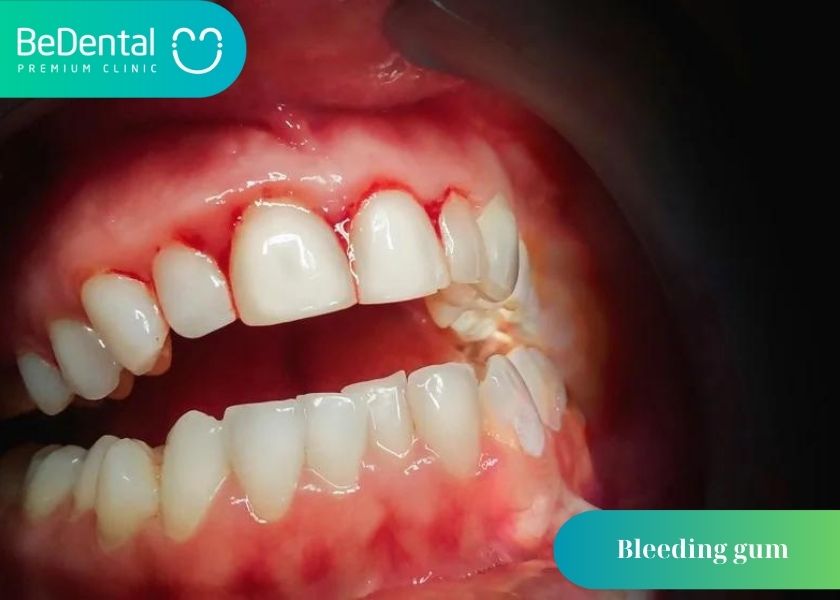
Causes of bleeding gums
Dental care issues are generally to blame for gum bleeding. When you have periodontitis or gingivitis, an infection of the gums, your gums become vulnerable and prone to bleeding.
Gingivitis
Gingivitis most often develops when plaque is left on gum lines for an extended period of time. Plaque is the term used to describe the bacteria and debris that stick to your teeth.
Brushing your teeth and clearing plaque are the best protections against cavities. However, plaque may continue to build up along your gum line if you don’t brush and floss regularly.
Plaque can become tartar (calculus) if it is not removed, which can cause more bleeding. Furthermore, plaque buildup close to your gums might result in gingivitis.
Symptoms of gingivitis include:
- swollen gums.
- discomfort in the mouth and the gums.
- bleeding gums.
Periodontitis
Periodontal disease (periodontitis) can occur when gingivitis develops. An infection of the gums, jawbone, and tissues connecting your teeth and gums is known as periodontal disease. If you have periodontitis, it’s possible that your teeth will become loose or even fall off.
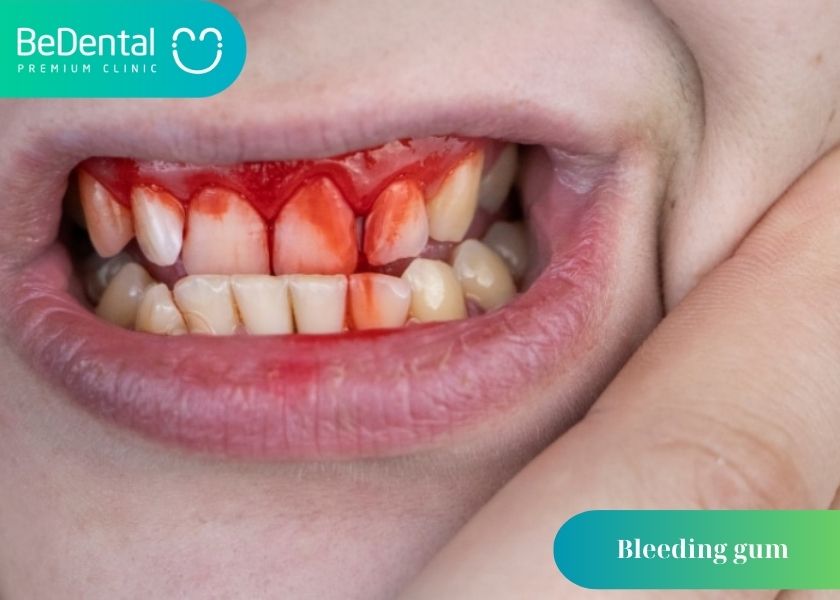
Lack of Vitamin
Vitamin C and vitamin K deficiencies can also cause gums to bleed easily.
If you experience bleeding gums that aren’t the result of poor dental hygiene, ask your doctor to check your levels of vitamins C and K. Additionally, consume both nutrients in your diet to make sure you’re getting the vitamins you need to be healthy.
Foods containing great amounts of vitamin C:
- citrus fruits and juices
- broccoli
- strawberries
- tomatoes
- potatoes
- bell peppers
Foods containing great amounts of vitamin K:
- watercress
- kale
- spinach
- Swiss chard
- lettuce
- mustard greens
- soybeans
- canola oil
- olive oil
During pregnancy
Pregnancy is a medical condition that includes hormonal changes. Such hormonal changes may result in gum inflammation and discomfort. It is possible to stop gum bleeding at this time by practicing good hygiene. A dental appointment is necessary to prevent problems if they develop.
Stressful condition
Stress can lead to gingival inflammation, which makes the gums more vulnerable to damage. Stress also causes an immune system to become repressed, which encourages bacterial infection and interferes with normal coagulation processes.
Lack of blood (Anemia)
A lack of red blood cells results in the medical condition known as anemia. One kind of anemia associated with Vitamin B12 malabsorption, pernicious anemia, also causes gum bleeding.
Other causes
Sometimes people who wear dentures will get bleeding gums. This is more likely to occur when dentures are too tightly fitted.
Consult a dentist or orthodontist if your gums are bleeding due to dentures or other dental appliances. They may need to take new impressions in order to create a mouthpiece that fits more comfortably.
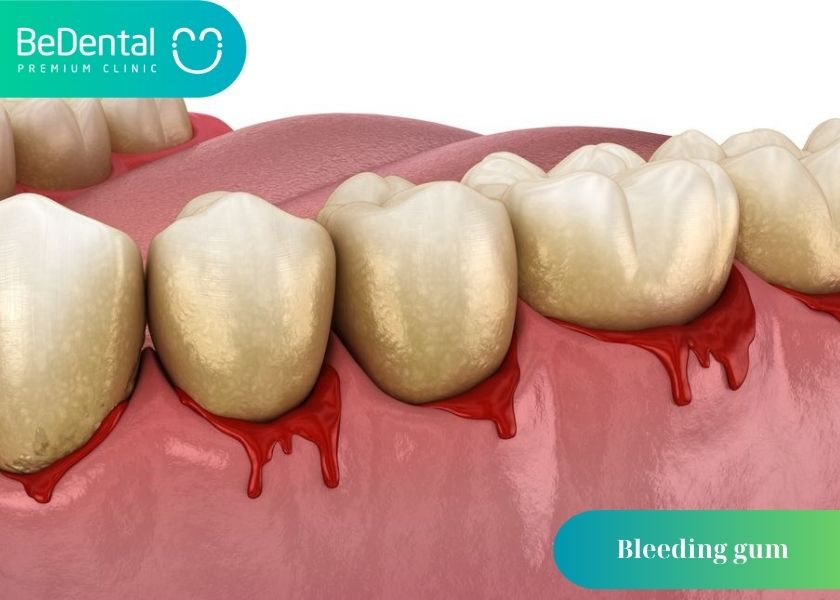
Treatment for bleeding gums
- Gum bleeding treatment in office
The first step in gum bleeding treatment is practicing good oral hygiene.
Visit your dentist twice a year to get your teeth thoroughly cleaned. You may schedule a dental appointment with a local expert using our BeDental service. Your dentist will let you know whether you have gingivitis and will give you instructions on how to brush your teeth correctly. By brushing and flossing properly, plaque may be eliminated from the gum line and your risk of developing periodontal disease can be reduced.
To reduce plaque buildup in your mouth, your dentist could also demonstrate how to use an antiseptic mouthwash. A warm salt water treatment may also help to soothe the swelling.
Use a soft toothbrush. It will be mild on swollen gums, especially if you have bleeding after brushing your teeth. Bristles that are medium-hard can be too abrasive for your sensitive gums.
Another option is an electric toothbrush. These toothbrushes might be simpler for you to clean your gum line than a manual toothbrush because of their particularly designed brush heads.
- Gum bleeding treatment at home
- Using gauze
Gum bleeding can be minimized by practicing good oral hygiene.
Applying a fresh, wet piece of gauze to the wound can help stop bleeding, just like it would everywhere else on the body.
Continue applying mild pressure to the gauze until the blood stops leaking.
In those with low immune systems or other medical conditions, gum bleeding may persist for a long period. Consult a dentist for advice on how to halt the blood flow.
- Using ice
Ice packs are particularly beneficial for treating wounds and scrapes in the mouth that produce edema. Additionally, they can aid in reducing gingivitis-related discomfort and swelling.
Use the ice for 10 minutes at a time, followed by 10 minutes off. If the bleeding does not stop, some people may consider calling a doctor.
- Using mouthwash
Antibacterial mouthwash can be used to treat and prevent gum bleeding. They reduce inflammation and kill bacteria to soothe sore, swollen, and bleeding gums.
The common cause of bleeding gums, gingivitis, may be treated and prevented by using mouthwash.
Typical active components found in mouthwashes include:
- chlorhexidine
- hydrogen peroxide
Keep mouthwash on hand in gum bleeding treatment.
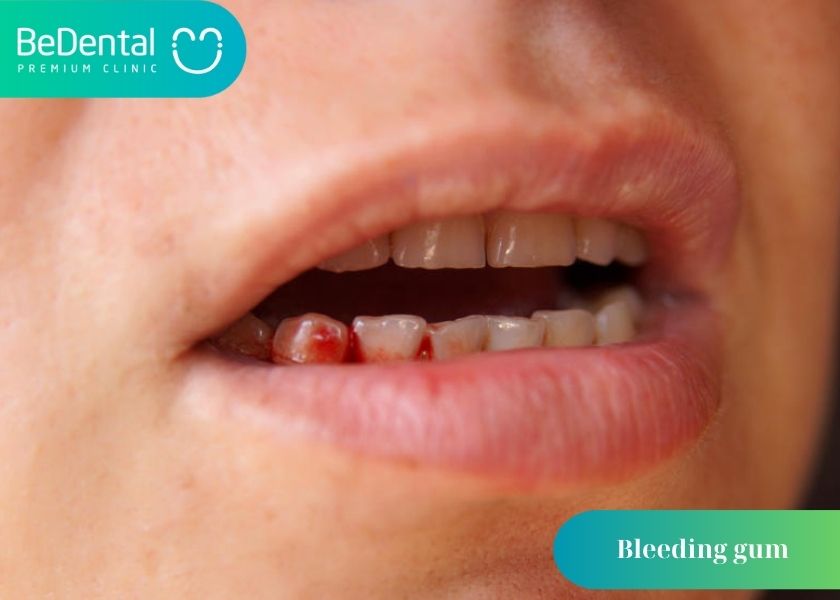
- Using a warm salt rinse
By rinsing with salt water, you can shorten healing times and help control germs. The American Dental Association (ADA) recommends blending half a teaspoon of salt with 8 ounces of warm water to create an oral salt rinse.
To thoroughly clean the mouth, swish the salt water around, and then spit the mixture out. Several times daily, or as instructed by your dentist, repeat this.
- Applying a turmeric paste
There is no supporting evidence for turmeric paste as a gum-bleeding therapy.
Natural antibacterial and anti-inflammatory properties are present in turmeric. The signs of gingivitis and bleeding gums may be lessened by applying a turmeric paste to the gums.
But until now, there has been no solid scientific proof that turmeric has any impact on gum disease or bleeding gums.
The researchers observed similar anti-inflammatory effects in those who used these gels for 10 minutes twice daily.
Turmeric is yellow, but as long as someone thoroughly rinses their mouth after using it, it shouldn’t discolor their teeth. A lot of individuals use turmeric in combination with baking soda to whiten their teeth. However, there is no proof of the effectiveness of this treatment.
- Using the right toothbrush
If one has sensitive gums, they may choose a very soft or sensitive toothbrush. Firm or medium bristles are too abrasive on the gums.
The ADA suggests using a toothbrush with soft bristles to clean your teeth twice a day for two minutes each time. Electric and manual toothbrushes are both said to be efficient.
Replace your toothbrush every three to four months, or sooner if the bristles are worn out.
- Flossing every day, but be gentle
Starting a new flossing routine might initially result in bleeding. It’s not permitted to stimulate the gums. However, the bleeding should stop after a few days of regular flossing.
Regular flossing enhances gum health overall and should eventually lessen gum bleeding.
- Avoiding processed and sugary foods
Too much consumption of processed, starchy meals might result in gingivitis and bleeding gums.
Foods that are starchy might attach to your teeth and gums and turn into sugar. This habit may result in bleeding, gum irritation, and an increase in tooth decay.

- Eating more leafy greens
Leafy greens like kale are abundant in vital elements.
Leafy greens are a great source of several nutrients, including Vitamin K. For examples lettuce, and spinach.
People with a vitamin K shortage may have more blood than usual because a vitamin K deficiency might alter how quickly blood clots.
Q&A
How can I stop my gums from bleeding?
To stop your gums from bleeding, maintain good oral hygiene by brushing gently twice a day with a soft-bristled toothbrush, flossing daily, and using an antiseptic mouthwash. Eat a balanced diet, stay hydrated, and avoid smoking. If bleeding persists, consult a dentist to check for gum disease or other issues.
Why are my gums bleeding without brushing?
Without cleaning your teeth first thing in the morning, bleeding gums might be a sign of gingivitis or periodontal disease. Plaque can still build and form deposits on the teeth despite regular brushing.
Are bleeding gums serious?
Are bleeding gums serious? You might wonder a lot. Well, there are a variety of reasons why gums bleed, from wrong brushing technique to more serious conditions like gum disease. Gum bleeding is not harmful in itself, but the underlying condition causing this symptom may be.
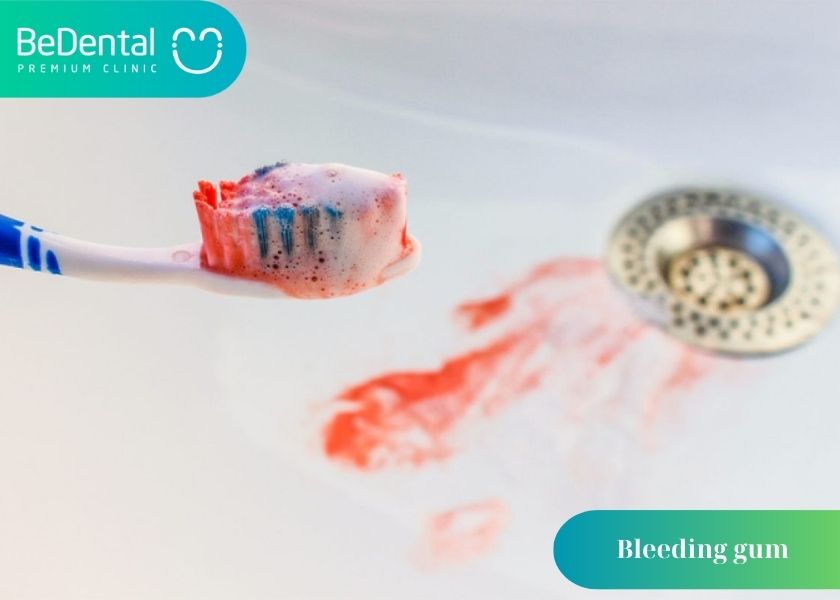
What does bleeding gums mean?
Bleeding gums often indicate gum inflammation or gingivitis, caused by plaque buildup due to poor oral hygiene. It can also result from overly aggressive brushing, vitamin deficiencies, hormonal changes, or underlying health conditions like diabetes. Persistent bleeding may signal gum disease and should be evaluated by a dentist.
What is a good toothpaste for bleeding gums?
Parodontax Clean Mint toothpaste is clinically proven to help reduce bleeding gums by removing plaque bacteria, a leading cause of gum issues. In a study, 80% of users reported improved gum health after using Parodontax for 12 weeks.
See more
Porcelain Veneers and 3 factors influence the price of Porcelain Veneers
In-Office Teeth Whitening and 5 Steps To A Bright Smile
Tartar and 6 ways to prevent its return
Scaling and Polishing – Deep Oral Cleaning and 5 Habits To Keep Teeth Healthy
GUM CONTOURING – DOES IT HURT AND HOW MUCH DOES IT COST?






Pingback: Loose teeth and the 3 most common causes – Be Dental
Pingback: Bad Breath and 6 Common Questions – Be Dental